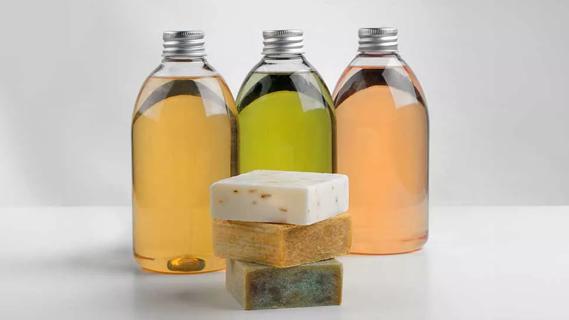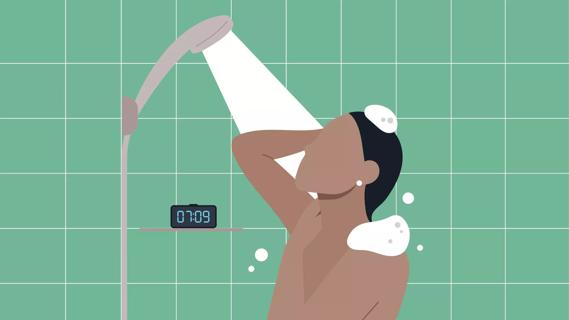Ordinary soap and water or an alcohol-based sanitizer can do the job
Video content: This video is available to watch online.
View video online (https://cdnapisec.kaltura.com/p/2207941/sp/220794100/playManifest/entryId/1_rooq4129/flavorId/1_5f3sgelj/format/url/protocol/https/a.mp4)
Are Anti-Bacterial Soaps Harmful or Helpful?
We wash our hands a lot.
Advertisement
Cleveland Clinic is a non-profit academic medical center. Advertising on our site helps support our mission. We do not endorse non-Cleveland Clinic products or services. Policy
Actually, that might be an understatement after a year of hand soap shortages.
With the constant reminders to wash and sanitize your hands, you’ve probably been stocking up on antibacterial soap because the name suggests that it offers extra protection against germs. However, you might be surprised to find out that this kind of soap doesn’t truly offer additional protection against germs. What’s worse it that some of the ingredients in antibacterial soaps can actually do more harm than good.
In 2016, the Food and Drug Administration (FDA) issued a final rule regarding the sale of soaps that contain certain antibacterial chemicals. Since manufacturers had failed to prove that the ingredients in these soaps were safe to use long-term or more effective than soap and water, over-the-counter (OTC) consumer antiseptic wash products containing certain active ingredients could no longer be marketed.
The FDA’s action involved 19 chemicals that are ingredients in about 40 percent of soaps, including liquid hand soap and bar soap. The most common of these chemicals are triclosan, which is used mostly in liquid soap, and triclocarban, an ingredient in bar soaps.
This rule did not affect consumer hand sanitizers, wipes or antibacterial products used in healthcare settings.
Advertisement
According to the FDA, some studies have revealed that long-term exposure to these chemicals could pose health risks, such as bacterial resistance or hormonal effects. And as of 2019, the FDA still maintained this stance.
Washing with plain soap and running water remains one of the most important steps you can take to avoid getting sick and to prevent spreading germs to others, says family medicine physician Daniel Allan, MD.
Eighty percent of all infections are transmitted through touch, but we can avoid most of them by simply washing our hands the proper way, Dr. Allan says. If you have a choice, choose warm water.
“Warm water is probably your best bet,” Dr. Allan says. “It loosens the oils and soils on your hands. Use at least a teaspoon of soap, and lather in the soap for at least 15 seconds before you rinse well. Then dry your hands using a clean towel.”
Taking the right amount of time to wash is key, Dr. Allan says.
Research shows that most people wash their hands for less than 10 seconds, Dr. Allan says. Increasing the wash time from 15 to 30 seconds can have a huge impact — it can decrease the number of bacteria on your skin by tenfold.
The Centers for Disease Control (CDC) also recommends washing your wrists, around your fingernail edges and even all the way up to the forearms, as these areas tend to carry a significant amount of bacteria.
Special soaps are not necessary to clean your hands, Dr. Allan says. This is because soap alone doesn’t kill bacteria. Instead, soap’s role is to loosen dirt and germs, and help the water remove them from your skin.
“The illness rates are the same between people using regular soap and people using antibacterial soaps,” he says. “As long as you wash, you’re getting rid of bacteria.”
If soap and water are unavailable, use an alcohol-based hand sanitizer, which is an effective germ-killer, Dr. Allan says. Studies have shown that within 30 seconds of use, a hand sanitizer kills 99% of the bacteria on your hands, so it can significantly reduce your chance of getting sick. Just make sure your hand sanitizer has 60% ethyl alcohol or 70% isopropyl alcohol.
Advertisement
Learn more about our editorial process.
Advertisement

Bathing once a day is the general guidance, but you could also have reasons to soap up twice a day or not at all

You’re sharing your sheets with dust mites, bacteria and lots of dead skin, so you’ll want to keep your bedding fresh

You may notice itching, redness and swelling after wearing or using laundered items

We don’t fully understand how cleanliness impacts immune system development, but we do know that preventing illness is important

How often you lather up your locks can depend on various factors, like hair type, age and ethnicity

An icy blast may boost mental clarity, increase circulation and give your skin a little glow — but don’t overdo it

This olive oil-based soap is generally mild and safe when diluted

It’s a wash — when you bathe is a personal preference

The tropical fruit is a good source of antioxidants and vitamin C

Most people fall asleep within 10 to 20 minutes, but if your experience is different, adjusting your sleep schedule may help

Exploring your hidden side can lead to better understanding of what makes you tick